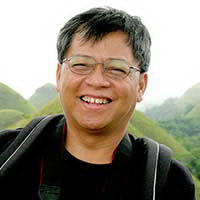

And so it is back to spying on schools for the military, and it appears that it's UP and PUP that are the primary targets of its intelligence gathering.
As expected the military immediately went into full conspiratorial theory mode, warning that communists operating in the schools, but most especially the two state universities, have been plotting in the school cafeterias on how to overthrow the faltering regime of the Mayor.
"Red October" is good-to-go accordingly since the pulas have convinced the dilawan to join the plot, with firepower provided by the NPA and pro-Trillanes chicken-hawks inside the military.
Will they succeed?
We all know that this bugbear of a revolutionary project is pure hogwash. The communists have always been on campus (they go by the sobriquet "national democrats"), and they have become a normal campus sight – loud, militant, and tiny.
It is their occasional control of the student paper that gives the impression of widespread radical protests on campus, but in truth, all this has been hot air. Unless it is issues that affect students directly, left-wing protests in academia have been, at best, elfin. At UP, the Alpha Phi Omega fraternity annual "see-how-small-my-plonker-is" Run attracts more students than communists waving red flags and expressing their love for Joseph Stalin.
UP campus dwellers love their militants as they hold dear their acacia trees. The bromance has even reached a point where the community has adopted radical rituals as their own. Look at how the taas-kamao, once a communist trademark, is now a university ritual. Even basketball players raise their fists, not in protests, but to display "UP Pride!!"
So, as expected, is a lot of mischievous laughter at Diliman every time the Police Director Oscar David Albayalde expressed worry over campus communists prepping up for "Red October."
A friend who watched Albayalde's cantankerousness reminded that he is not an original. His predecessors also warned UP officials of communist plots by teenagers, bragging of the accuracy of their "intel." Unfortunately, their spies were not top-notch, and the reports they sent back were often based on inane observations.
Like their current legatees, the older infiltrators were equally hilarious. For example, about 6 months after Marcos declared Martial Law, the military confiscated a manifesto with the word "revolution." This was immediately reported to Crame as the work of a "communist cell."
It turned out that the "subversive" group was the Campus Crusade for Christ, the forebear of the likes of the Appointed Son of God from Davao, Pastor Quiboloy. Activists chuckled at this faux pas, and would have doubled up in laughter had they known that these spies' bosses hardly gave a hoot to reports of campus communism. For in truth, the likes of Defense Secretary Juan Ponce Enrile and his generals worried more about fraternity rumbles than communist "silent marches" on campus.
Just how bad military intelligence was back then?
Consider this: in their first ever public protest in December 1974, activists shocked the military which did not expect protests to return that fast on campus. Three years later, UP radicals once again caught the military with its pants down when they staged the first ever large-scale protests since the declaration of martial law. The issue was over the arbitrary decision by UP authorities to raise tuition fees. So dumbfounded was the Diktador that he ordered a rollback. The military was spooked and started arresting student leaders. By then it was too late to stop the resurgence of student protests.
The long and short of it is that military poking about in campus was always never efficacious. The spies in academia – many of them rookies sent to hone their skills of observation – were just bad. This is not to say that AFP intelligence was not that good. The late Army Colonel Rodolfo Aguinaldo and Police General Rodolfo "Boogie" Mendoza were exceptional communist hunters, but they also knew the left-wing organizing in schools were minor league. Spying there was left to the amateurs.
But that is not the case anymore today. The likes of Aguinaldo and Mendoza are gone, and military intelligence even in war zones is pitiful (just look at what happened in Marawi). In the time of the amateur, every tale from the underground, even in petite arenas like the schools, where, unlike the 1970s, communist presence has become negligible – becomes big news. – Rappler.com
Patricio N. Abinales writes for Rappler.